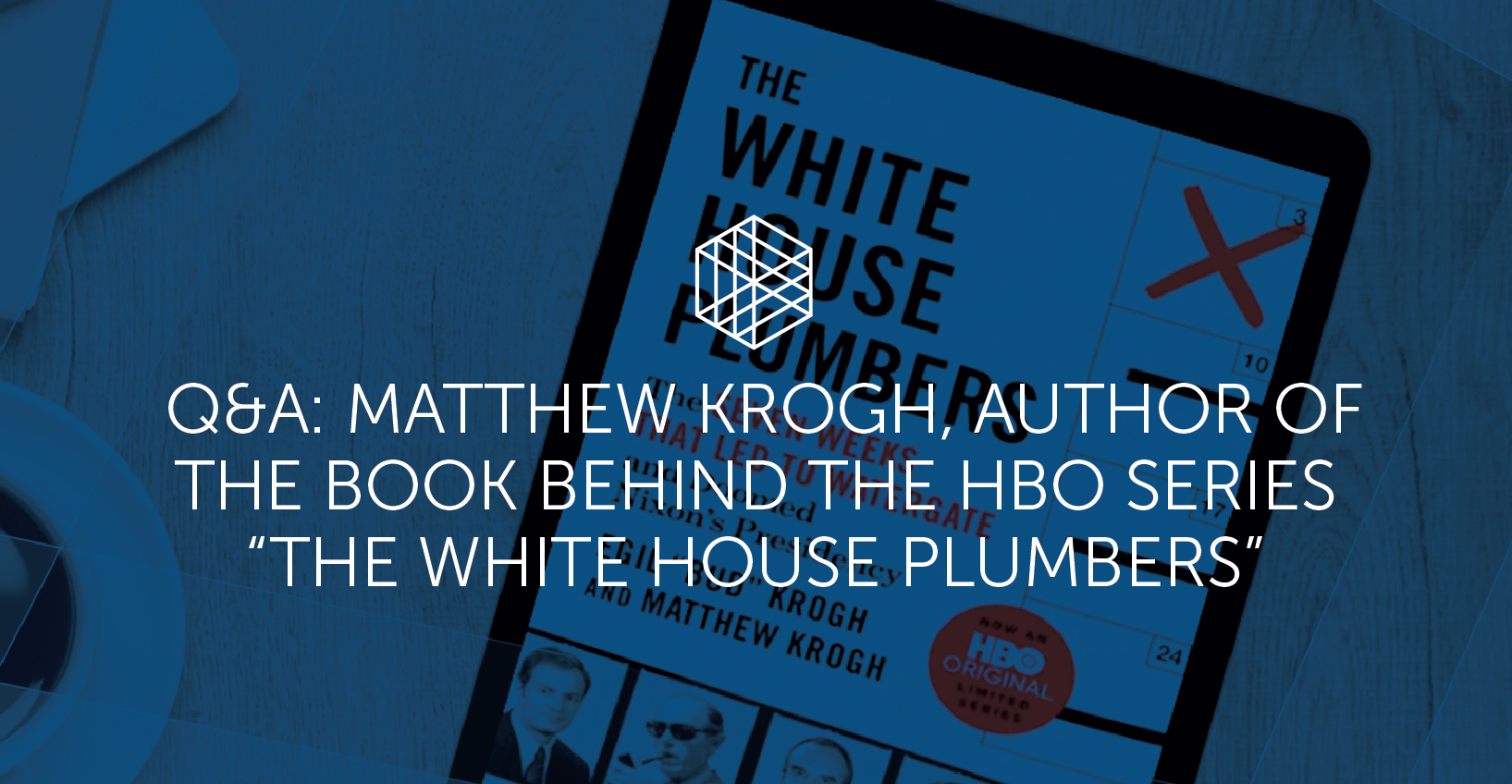Q&A: Matthew Krogh, author of the book behind the HBO series “The White House Plumbers”

By Annie Suhy, Staff Writer | June 2023
Fact is sometimes stranger than fiction. This is proved in The White House Plumbers: The Seven Weeks That Led To Watergate, the true story of what happened leading up to one of the most famous conspiracies in presidential history, as told by one of the men involved, Egil “Bud” Krogh.
The behind-the-scenes account was released as a five-part limited series streaming on HBO and starring Woody Harrelson and Justin Theroux in May 2023.
For more on the lesser-known series of events that led to the Watergate scandal, co-author Matthew Krogh gives an inside perspective, based on conversations with his dad, Bud Krogh, on what can happen when loyalty turns dangerous.
PoR: Who were the “White House Plumbers?”
Matthew Krogh: Well, I guess first I should say, they weren’t THAT kind of plumber. “The Plumbers” was the nickname for a group of five White House staffers, formed by and originally led by my dad, Egil “Bud” Krogh, created to stop national security leaks. The group came together as the SIU in a time of war, unrest and a paranoid president. And the leaks at the time were of real concern, from military analyst Daniel Ellsberg’s release of “The Pentagon Papers” associated with the Vietnam war, to the release of the United States’ negotiating position during tense nuclear arms talks with the Soviet Union. President Nixon was determined to stop those sorts of leaks—and the SIU, the Plumbers, were the team assigned the job. The president’s fervor infected the group from the very beginning—and that determination to get it done, at all costs, was part of what led the Plumbers down the dark path they chose.
PoR: So then, how did they get the name, “Plumbers”?
Matthew Krogh: David Young was the second member of the Plumbers after Krogh, and the member who really devoted time to directing the initial operations. As my dad tells it, when Young told his grandmother about his job, she said how proud the family is that he’s a plumber stopping leaks in the White House. This contemporaneous story from The New York Times details that Young even put a “David Young – Plumber” nameplate on his office.
PoR: What was the experience like co-authoring with your dad?
Matthew Krogh: It was a heck of an experience putting together the disparate—and usually very poignant or funny—stories my dad had told my brothers and me our whole lives. So much was left out of the book, as we worked together to negotiate which aspects of the story we would tell, and how to limit the narrative to a unique perspective unavailable in the other histories and personal accounts of Watergate. The end result is a book that focuses on the seven weeks that could be seen as an inflection point, when the Nixon presidency effectively created a secret society in the form of the SIU that operated with few rules and even outside the law.
The writing itself involved a lot of give and take, back and forth, as Dad told stories and I dove into primary materials of the time that could weave it all together. On top of his regular job and daily life in Seattle, the book took a lot of energy for him. So much so that he ended up buying a cozy recliner to nap in while we worked, a recliner that still resides in my dining room.
PoR: What’s something about the Watergate story that people might be surprised to know?
Matthew Krogh: In what might be a surprise for many, the story of the White House Plumbers isn’t originally about Watergate at all. The focus of the Watergate scandals and reporting was, appropriately, on the politically motivated break-in of the Democratic National Committee’s headquarters during a tense election season. But the story of “The White House Plumbers” reveals how a secret society with little oversight, motivated by a zealous president, can create lawless conditions with unintended consequences.
The second surprising element? It was only a mistake by G. Gordon Liddy and E. Howard Hunt that uncovered the original break-in committed by the Plumbers, and led to the cover-up by Nixon that was a key cause of his downfall. That mistake? When Liddy (FBI) and Hunt (CIA) forgot to remove the film from a spy camera borrowed from the CIA, which was used in the initial break-in of Daniel Ellsberg’s psychiatrist. The film and use of the camera was later revealed by the CIA as the Watergate scandals unfolded.
PoR: The book was recently turned into an HBO series that was released on May 1. How did the journey from book to film come about?
Matthew Krogh: The HBO deal was definitely a story of opportunity out of tragedy. In 2015 and 2016, dad’s health was deteriorating, and resulted in a series of strokes that landed him in George Washington University Hospital. His main doctor there listened to my dad telling stories, and eventually connected the original book version of “The White House Plumbers” with his son David Bernad, a Hollywood producer with extensive experience including TV series like Superstore and White Lotus.
PoR: Does the book differ from the TV series in any way?
Matthew Krogh: The book offered the jumping off point for the writers and director of the HBO show, providing the fodder for a story that follows the evolving and intertwined relationship between Liddy and Hunt, who first worked together after joining the SIU. The first episode closely follows the seven weeks described in the book, but subsequent episodes take place later in the timeline when Hunt and Liddy moved over to political operations in the Committee to Re-Elect the President (known by some as CREEP).
PoR: Bud was sentenced to time in prison for his involvement. How much time did he serve, and what was his life like after prison?
Matthew Krogh: Dad— Bud—was the first, and one of the only, Watergate offenders to plead guilty. In Dad’s case, he pled guilty to violations associated with “unreasonable search and seizure” at the office of Ellsberg’s psychiatrist, Dr. Lewis Fielding. He spent four and a half months in a federal medium security prison, Allenwood Penitentiary, and exited through a halfway house.
After prison, Dad was disbarred from the Washington State Bar, and spent years trying to reclaim his law license. He did get reinstated to the bar, but only after years of scathing letters to the editor in the Seattle Times and Post Intelligencer, some of which make the trolls in today’s online forums look almost reasonable. Reading those letters—so impassioned, so angry—was the first time I really understood the toll that the Watergate scandal had taken on so many, and how the scandal had devastated Americans’ trust in their government.
Over the last decades of his life, Dad made a name for himself in the energy field, focusing on issues of hydroelectric power in the Pacific Northwest. Then, after his return to DC, he finished his career lecturing on issues of integrity and principle-based decision-making for the Center for the Study of the Presidency and Congress, as well as at the fantastic DC-based school called the Center for Ethics and Global Leadership.
PoR: It seemed like he turned his life around after this experience. Can you tell us about some of the hard-won lessons learned?
Matthew Krogh: The original structure of the SIU created a secret society with opaque funding, top-down pressure, paranoia and over-the-top loyalty and devotion to the president. The times were turbulent, and society was experiencing intense unrest. Dad’s focus in later years was on understanding how those difficult variables led him to compromise his own integrity, in ways that were so clear in hindsight and so difficult to see in the moment.
After the publication of the original version of “The White House Plumbers,” his focus was on spreading those lessons in a format he called “The Integrity Zone.” The Integrity Zone encouraged people in tough moments to think about three key questions: Is my analysis whole and complete? Is this action right, and legal? And is this action good? Dad’s belief was that by diving into these three questions, a person could be sure to chart a course that allowed them to make a difficult decision while protecting their own integrity.



